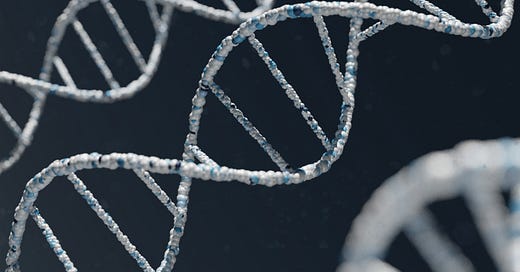Hi! I’m Jacqueline Nesi, a psychologist and professor at Brown University, co-founder of Tech Without Stress, and mom of two young kids.
Thanks so much to the paying subscribers who make Techno Sapiens possible! If you’d like full access to monthly Q&A’s like this one, please consider a paid subscription. You’ll also get access to the full Q&A archive, with answers to questions like: Is it bad to let my baby watch TV? and How do I get my toddler to listen?
Remember to submit your questions for future Q&A’s here or by replying to this email. Thanks for your support!
I came across this study on X, which basically seems to conclude that the way our kids turn out is entirely based on genetics, and parenting doesn’t matter at all. This seems so counterintuitive, but what do you think? Would love a post on nature vs. nurture and how much parents actually matter!
Every few years, there seems to be a brief resurgence in the “parents don’t matter” rallying cries. A new book, academic paper, or think piece comes out. TED Talks are performed. Social media debates ensue. And we parents are left staring blankly into the distance—our children screaming and waving around the toy chainsaws they got for Christmas1—wondering if any of this even matters.
Should we just throw in the towel on this whole parenting thing?
The idea that parenting makes no difference in children’s development is a subset of the larger nature vs. nurture debate. This debate has been around for hundreds of years, but the modern version kicked off in the 1990s, with advances in genetics research. Various iterations of the argument that nature (i.e., genes) vastly outweighs nurture (i.e., parenting) have sprung up since then, from The Nurture Assumption (1998) to Selfish Reasons to Have More Kids (2012) to Blueprint (2018).
Meanwhile, the academic research chugs along and, sometimes—as you mentioned—makes the rounds on Twitter/X.
So, what’s the deal? Do parents matter?
The answer is yes. Okay! See ya next week!
[I am kidding. The question of nature vs. nurture is obviously very complicated—perhaps more complicated than can be addressed in a single, 1,000-word post that’s causing unsettling flashbacks to my grad school “Biological Bases of Behavior” course—but we shall forge ahead!]
Why is this so hard to study?
First, let’s take a step back and talk about why the nature vs. nurture debate is so hard to settle. It is extremely difficult to separate the influence of genes and the environment because, in the vast majority of cases, they are “non-independent.” They influence each other in numerous, sometimes surprising, ways. Things quickly get complicated.
Parents have genes, and those genes impact the ways they act (i.e., the environment they create). Kids have the same genes, but they also live in the environment their parents created. The effect goes in the other direction, too: kids’ behavior (based on some combination of their genes and environment) affects how parents respond. This further influences the environment.
To top it all off, there’s the concept of epigenetics—basically, our genes are not set in stone. Our environments can actually rearrange our epigenetic code, affecting how much or little we express our genes (simple explanation here).
Many research methods have been developed to address these confounding effects. Adoption studies, for example, which aim to rule out the genetic influence of parents, and twin studies, which, traditionally, compare similarities between identical twins (who share nearly 100% of genes) and fraternal twins (who share only 50%). There are many variations of these studies, and importantly, new methods can combine them with genomic data to offer new insights.
So what is it? Nature or nurture?
What do these studies tell us? Is it nature or nurture?
The simplest answer, of course, is both. Research can give us some hints on exactly how much each matters, and in what circumstances, but there’s still a lot we don’t know.
That said, here is how I am currently making sense of this question (and that study you mentioned).
Keep reading with a 7-day free trial
Subscribe to Techno Sapiens to keep reading this post and get 7 days of free access to the full post archives.




